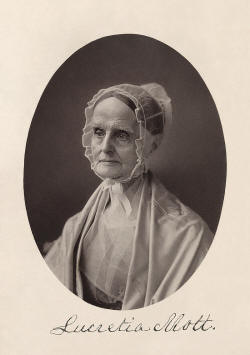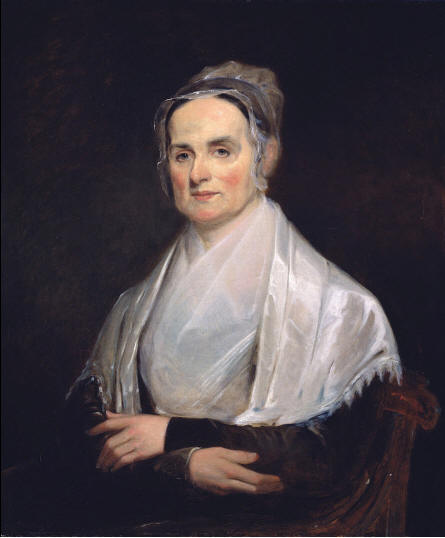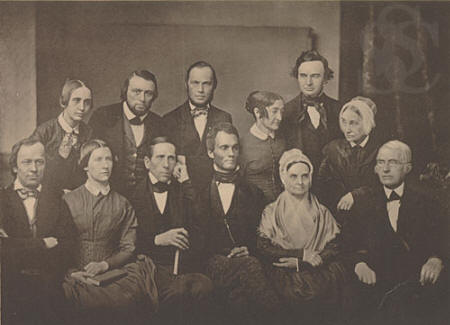

Queer Places:
Roadside, Latham Park, Elkins Park, PA 19027
Fair Hill Burial Ground
Philadelphia, Philadelphia County, Pennsylvania, USA
 Lucretia
Mott (née Coffin;
January 3, 1793 – November 11, 1880) was a U.S.
Quaker, abolitionist, women's
rights activist, and social
reformer. She had formed the idea of reforming the position of women in
society when she was amongst the women excluded from the World
Anti-Slavery Convention in 1840. In 1848 she was invited by Jane
Hunt to a meeting that led to the first meeting about women's rights. Mott
helped write the Declaration
of Sentiments during the 1848 Seneca
Falls Convention. Her speaking abilities made her an important
abolitionist, feminist, and reformer. When slavery was outlawed in 1865, she
advocated giving former slaves who had been bound to slavery laws within the
boundaries of the United States, whether male or female, the right to vote.
She remained a central figure in the abolition and suffrage movement until her
death in 1880. Mott was a Quaker preacher early in her adulthood.
Lucretia
Mott (née Coffin;
January 3, 1793 – November 11, 1880) was a U.S.
Quaker, abolitionist, women's
rights activist, and social
reformer. She had formed the idea of reforming the position of women in
society when she was amongst the women excluded from the World
Anti-Slavery Convention in 1840. In 1848 she was invited by Jane
Hunt to a meeting that led to the first meeting about women's rights. Mott
helped write the Declaration
of Sentiments during the 1848 Seneca
Falls Convention. Her speaking abilities made her an important
abolitionist, feminist, and reformer. When slavery was outlawed in 1865, she
advocated giving former slaves who had been bound to slavery laws within the
boundaries of the United States, whether male or female, the right to vote.
She remained a central figure in the abolition and suffrage movement until her
death in 1880. Mott was a Quaker preacher early in her adulthood.
Sarah Pugh never wore cotton or ate sugar because both of these were produced by slaves. On Sundays Sarah would sit on the porch, knitting, to protest against the rigid Sabbatarianism of Philadelphia, together with her friend Lucretia Mott, co-organizer with Elizabeth Cady Stanton of the famous 1848 Seneca Falls Women’s Rights Convention, the first public women’s rights meeting in the United States.

Lucretia Mott at the age of 49 (1842), at the National Portrait Gallery in Washington, D.C.

A photograph of the Executive Board of the Pennsylvania Antislavery Society taken in 1851. Standing, from left to right, are Mary Grew, E. M. Davis, Haworth Wetherald, Abby Kimber, J. Miller McKim, and Sarah Pugh. Seated, from left to right, are Oliver Johnson, Mrs. Margaret
Jones Burleigh, Benjamin C. Bacon, Robert Purvis, Lucretia Mott, and James Mott.
Lucretia Coffin was born January 3, 1793,[1] in Nantucket, Massachusetts, the second child of Anna Folger and Thomas Coffin.[2] Through her mother, she was a descendant of Peter Folger[3] and Mary Morrell Folger.[4] Her cousin was Framer Benjamin Franklin, while other Folger relatives were Tories.[5] She was sent at the age of 13 to the Nine Partners School, located in Dutchess County, New York, which was run by the Society of Friends.[6] There she became a teacher after graduation. Her interest in women's rights began when she discovered that male teachers at the school were paid significantly more than female staff.[7] After her family moved to Philadelphia, she and James Mott, another teacher at Nine Partners, followed.[8]
In 1864, Mott and several other Hicksite Quakers incorporated Swarthmore College near Philadelphia, which remains one of the premier liberal arts colleges in the country.[25]
Mott was a pacifist, and in the 1830s, she attended meetings of the New England Non-Resistance Society. She opposed the War with Mexico. After the Civil War, Mott increased her efforts to end war and violence, and she was a leading voice in the Universal Peace Union, founded in 1866.[26]
On April 10, 1811, Lucretia Coffin married James Mott at Pine Street Meeting in Philadelphia. They had six children. Their second child, Thomas Mott, died at age two. Their surviving children all became active in the anti-slavery and other reform movements, following in their parents' paths. Her great-granddaughter May Hallowell Loud became an artist. Mott died on November 11, 1880 of pneumonia at her home, Roadside, in Cheltenham, Pennsylvania. She was buried near to the highest point of Fair Hill Burial Ground, a Quaker cemetery in North Philadelphia. Mott's great-granddaughter served briefly as the Italian interpreter for American feminist Betty Friedan during a controversial speaking engagement in Rome.[27]
My published books: